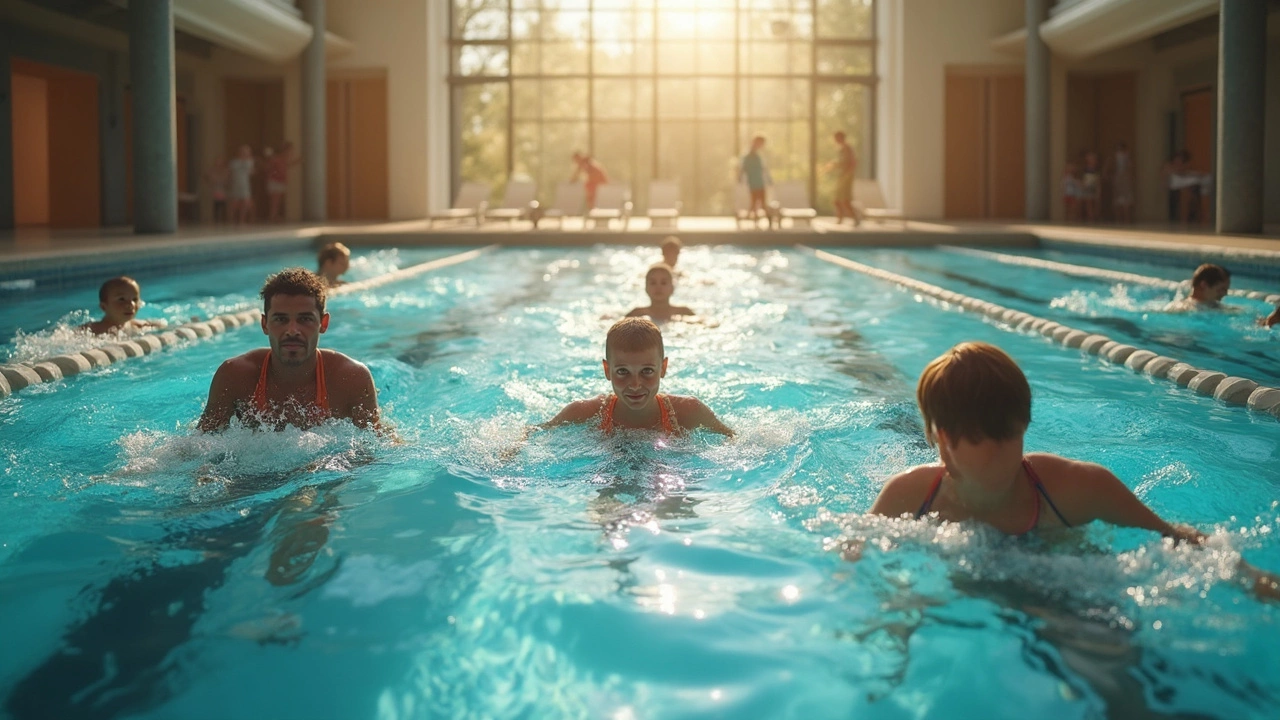How Many Days a Week Should You Learn to Swim?

So, you're ready to dive into the world of swimming, but you're scratching your head over how many times a week you should hit the pool. You're not alone! It's a common question with a few different answers depending on your unique situation.
Generally, practicing swimming two to three times a week is a sweet spot for most beginners. This frequency helps your muscles remember the new movements without leaving you too exhausted to enjoy the process. It's like learning to ride a bike; consistency is key. Plus, the more often you're in the water, the faster you'll get comfortable and build confidence.
But hold on, there’s more to this. Factors like your age, goals, and current fitness level can skew this number up or down. For example, kids might learn faster with more frequent sessions because they're more likely to absorb new skills quickly. On the flip side, adults who are juggling busy lives might benefit from fewer, more focused swims each week. Read on to explore what works best for you.
- How Often Should You Swim?
- Factors That Influence Your Schedule
- Benefits of Regular Practice
- Tips for a Successful Swimming Journey
How Often Should You Swim?
So, let's get into how often you should schedule your swimming lessons. If you're just starting, swimming two to three times per week is a solid choice. This allows your body to adapt to the new exercises, helping build muscle memory without overwhelming yourself.
Beginners: Find Your Comfort Zone
For beginners, this frequency is effective because your body needs time to recover while learning new movements. Think of it like learning the chords on a guitar—you wouldn't strum all day without a break. The same goes for swimming; balanced practice leads to better results.
Young children often benefit from more frequent practices as they're like little sponges, absorbing skills quickly when their interest is piqued. Consider short, fun sessions four to five times a week to keep them engaged.
Intermediate Swimmers: Stepping Up
If you've got a few lessons under your belt and feel ready to ramp things up, then increasing your sessions to three to five times a week might be beneficial. This is the stage where practicing more often helps improve endurance and refine your technique. You’re not focusing on just floating anymore; you’re aiming for speed and efficiency.
Advanced Swimmers: Eye on the Prize
Aspiring to compete or maintain advanced swimming skills? Well, hitting the pool almost daily, around six times a week, is often recommended. At this level, swimming isn't just about improving; it's about perfecting each stroke. It’s like training for a marathon but in water!
Keep in mind, these are guidelines and should be adjusted based on your personal goals and how your body feels. Regardless of your level, listening to your body and ensuring rest days are part of your plan is crucial to avoid burnout and injuries.
Adjusting Schedule: What About Rest?
Yes, rest. Don’t underestimate the power of taking a break. Your muscles need it to repair and rebuild. Some signs it's time for a rest day are feeling overly fatigued or noticing a decrease in performance.
Factors That Influence Your Schedule
When it comes to figuring out how often to learn to swim, several factors come into play. Your age, personal goals, current fitness level, and even time availability can all change how frequently you should be getting in the water.
Age and Physical Condition
Age can be a big factor. Younger children often benefit from shorter, more frequent lessons due to their fabulous capacity to absorb new skills quickly. On the other hand, if you're an adult learner, you might need to pace yourself a bit more. Also, be mindful of any physical conditions or limitations. Swimming is low-impact, but it's crucial to ensure your body can handle the activity level.
Goals
Your personal objectives will also steer your swimming routine. Are you just looking for a fun way to keep fit, or do you have aspirations of competing somewhere down the road? For basic swimming lessons, a couple of sessions a week is a great start. However, if you’re aiming for competition or advanced skills, ramping up to four or five times a week might be ideal.
Time Availability
It's the 21st century; we're all busy! Look at your schedule realistically to see how many sessions you can comfortably fit in without burning out. Consistency is key, so it's better to commit to a sustainable schedule you can stick with— even if it's just part-time sessions.
| Goal | Suggested Frequency |
|---|---|
| General Fitness | 2-3 times a week |
| Skills Improvement | 3-4 times a week |
| Competitive | 4-5 times a week |
At the end of the day, there’s no one-size-fits-all answer. Evaluating these factors can help you design a plan that doesn't just get you through your swimming practice, but lets you enjoy it as well.

Benefits of Regular Practice
Getting into the pool regularly has some incredible perks. You won't just improve your swimming skills—your overall wellbeing gets a boost too!
Build Muscle Memory
One of the biggest benefits of regular swimming practice is building up muscle memory. The more you practice, the more these movements become second nature. Your body starts to automatically correct your posture and movements based on your prior practice sessions, making swimming feel easier over time.
Increase Stamina and Fitness
Another great upside? Improving your stamina and fitness levels. Regular swimming lessons help strengthen your cardiovascular system and tone muscle groups you might not use much in other activities. Plus, it's a low-impact exercise, meaning it’s easy on your joints while giving your entire body a workout.
Boost Confidence
Consistent practice does wonders for your confidence in the water. Knowing that you can rely on your abilities makes swimming much more enjoyable. Who doesn't like that feeling of gliding through the water smoothly? This newfound confidence might even encourage you to try new strokes or face challenges like open water swimming.
Foster Mental Wellbeing
Also, swimming regularly can be a real mood booster. There's something about the rhythm of water and the act of challenging yourself that works wonders for stress. It’s not just physical stamina you're building; it's mental strength too.
Track Your Progress
Keeping a regular schedule also allows you to track progress effectively, like how long you can swim without stopping or how your speed improves. Seeing tangible results is incredibly motivating and makes it easier to set new goals.
It's clear that swimming multiple times a week doesn’t just make you a better swimmer. It's a holistic experience that benefits both body and mind in unexpected and delightful ways.
Tips for a Successful Swimming Journey
Embarking on a swimming adventure is exciting, but it can also feel a tad overwhelming. Here are some tried-and-true tips to make your swimming lessons a splashing success.
Find the Right Instructor
Your instructor plays a big role in how you learn to swim. Look for someone patient and experienced, who can cater to your learning style. A good instructor can make a world of difference in how quickly and effectively you pick up swimming skills.
Set Clear Goals
Why are you learning to swim? Is it to conquer your fear of water, improve fitness, or compete in races? Setting clear, achievable goals can give you a sense of direction and help track your progress. Plus, nothing feels better than reaching a milestone you set for yourself.
Practice Consistently
The magic happens when practice is consistent. Aim for two to three swimming sessions a week, as this frequency helps reinforce new skills without burning out. Remember, the key is consistency, not intensity.
Stay Relaxed and Have Fun
It's easy to get caught up in mastering every technique, but remember to relax and enjoy yourself. Swimming should be fun! The more relaxed you are, the easier it is for your body to move fluidly through the water.
Track Your Progress
Keep a log of your swimming sessions to monitor what's working and what's not. Logging your progress helps keep you motivated and shows how much you've improved over time.
Fuel Your Body Right
Swimming burns a lot of calories, so make sure to eat nutritious meals that give you energy but don't weigh you down. Light snacks before swimming, like a banana or some yogurt, can help boost your energy levels without making you uncomfortable.
Overcoming Plateaus
Hitting a plateau is normal in any learning process. If your progress starts to stall, consider switching up routines or trying new techniques. Sometimes, a fresh approach can reignite your progress.
Following these tips can turn your swimming learning experience from daunting to delightful. Remember to keep practicing, stay motivated, and most importantly, have fun with your swimming journey!
